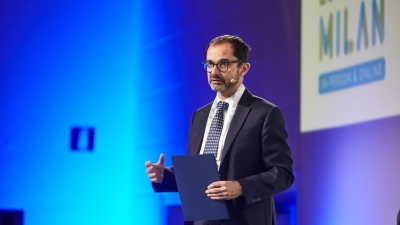Poland’s emergency contraception bill standoff following Duda veto

Poland’s emergency contraception bill ignites tense constitutional standoff, following the Polish health ministry’s response to President Duda’s veto.
Polish President Andrzej Duda vetoed a bill on 29 March that aimed to restore access to emergency contraception for people over 15 years of age. The president justified his decision by citing “respect for constitutional rights and the standard of children’s health protection.”
In anticipation of the veto, the government had announced plans to circumvent the presidential barrier by allowing pharmacists to issue prescriptions for the pill. However, the draft bill to enact such regulations has stirred controversy.
“(…) changes proposed in the draft should not be seen as a solution to the issue of access to emergency contraception in Poland,” Marcelina Kurzyk, told Euractiv – Kurzyk is coordinator of education and counselling activities at the Foundation for Women and Family Planning (FEDERA).
With or without a prescription?
In 2015, the European Medicines Agency ruled that emergency contraception, commonly known as the ‘morning-after pill’, could be sold without a prescription. However, the European Commission delegated the decision on the accessibility of the medicine to each member state.
Poland allowed over-the-counter access to emergency contraception until 2017, while the country experienced a rollback of women’s reproductive rights. The first Minister of Health in the Law and Justice (PiS) government amended the pharmaceutical law, mandating a prescription for this type of contraception.
Following the 2023 elections, the government under Donald Tusk’s leadership pledged to reintroduce over-the-counter access to the morning-after pill for girls and women aged 15 and above. This commitment was among the 100 specific actions promised to be executed by the new administration within 100 days of assuming office.
The government’s bill was approved by both the Sejm and Senate; however, it was vetoed by the President of Poland.
“The President, listening in particular to the voice of the parents, could not accept legal solutions allowing access of children under 18 to the use of contraception without a doctor’s control and ignoring the role and responsibility of the parents,” explained Duda’s Chancellery in an official statement.
Kurzyk stated that considering President Duda’s past decisions and statements, the veto regarding the “day-after pill” was not surprising. “The President has been repeatedly showing Polish women that he remains indifferent to expert opinions and any recommendations,” she added.
Now, a new ordinance by the Minister of Health is set to launch a pilot program starting 1 May this year, allowing pharmacists to prescribe emergency contraception. The draft has been sent for public consultation, which will last two weeks.
In the shadow of controversy
The proposed regulation outlines the availability of emergency contraception for individuals over the age of 15, subject to a proper consultation conducted by a pharmacist with at least one year of experience in a pharmacy. Each person will be eligible for a pharmaceutical prescription no more than once every 30 days.
This service will be accessible in pharmacies registering with the National Health Fund (NFZ). For each consultation, NFZ will reimburse pharmacies with 50 PLN (approximately 12 euros). However, the number of pharmacies expressing interest in participating in the program remains unknown. Kurzyk emphasized the issue of accessibility will still primarily affect smaller towns and rural areas, where the list of engaged pharmacies is expected to be limited.
But this marks just the beginning of the controversy.
Parental consent
“A child will not need a parent’s consent or knowledge to be able to obtain a pharmaceutical prescription for emergency contraception,” Health Minister Izabela Leszczyna said at a press conference on 4 April.
However, experts highlight that the draft regulation does not clearly specify the rules regarding the use of a pharmaceutical prescription by children aged 15 to 18.
In Poland, 15-year-olds are permitted to engage in intercourse, but according to the provisions of the Patients’ Rights Act, they are not empowered to make decisions regarding their treatment.
Marek Tomków, president of the Supreme Pharmaceutical Chamber, wrote on social media that guardian consent would be necessary for pharmacists to provide health services to people 15 to 18.
According to the health minister, the solution is not ideal, but it is the only one possible and legitimate until a president is elected “for whom human rights will be a real, and not just a declarative value.”
Kurzyk sums up the situation for Euractiv by saying that prescriptions are still in force as they were, with the difference that instead of counting only on the goodwill of the doctor, one can also count on the goodwill of the pharmacist.
[By Paulina Mozolewska, Edited by Vasiliki Angouridi, Brian Maguire | Euractiv’s Advocacy Lab]
Read more with Euractiv




